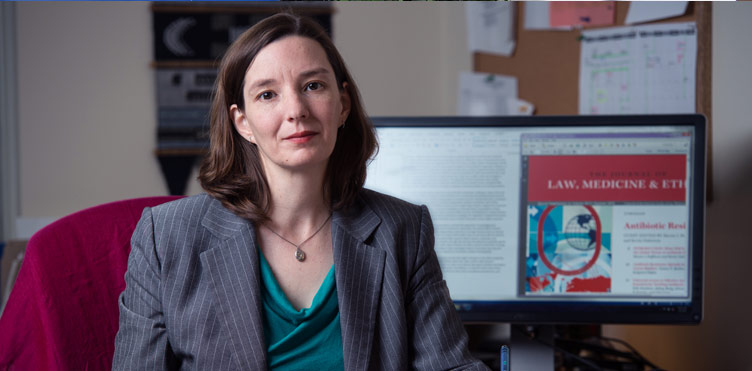
In 2016 alone, 700,000 people around the world died as a result of antimicrobial resistance. The World Health Organization estimates that number could rise to 10 million annually by 2050 if something isn’t done about the problem. A UNB researcher and her team are working to make sure that doesn’t happen.
Suzanne Hindmarch, a political scientist studying international relations and global health, is co-leading one of three teams sharing $300,000 in funding from the Government of Canada for this critical research.
An increasingly alarming global health problem, antimicrobial resistance (AMR) refers to the development of 'superbugs' -- bacteria, viruses, parasites and fungi that have evolved to become resistant to the drugs usually used to treat them. This resistance can render common infections and everyday procedures such as caesarean sections and joint replacement surgeries potentially fatal. Western medicine could return to the dark ages and all of its modern developments be rendered ineffective because of the inability to successfully fight microscopic organisms that were thought to have been conquered with the development of antibiotics during the last century.
Much of this resistance is due to the inappropriate use of antibiotics in both health care and animal agriculture. Methods of dealing with the spread of AMR include reducing the amount of antibiotics being used unnecessarily, prevention of infections, and development of newer, stronger drugs, some of which target the microbes in entirely new ways. These new drugs are in early stages of development, however, and the cost of those currently in use is often several times that of previously effective drugs. Because of this, much of the immediate global focus on reducing the AMR problem is through prevention and better use of the antibiotics we do have.
A unique feature of Hindmarch’s research program is the inclusion of mostly indigenous researchers who will consult with indigenous organizations in Canada to learn about their perspectives on antimicrobial resistance, the health challenges it presents in their communities and how they have been, and would like to be, involved in national and global response networks.
In Canada and throughout the world, indigenous peoples face much higher risk for not only common infections, but also illnesses that are considered to have all but ceased to exist in the developed world. As just one example, tuberculosis rates among Canada’s First Nations are five times that of the Canadian-born, non-aboriginal population. TB rates for Inuit are at least 50 times higher.
Hindmarch was drawn to the study of antimicrobial resistance by its highly complex, politically challenging nature. It was during her research of the global response that she was struck by the relative absence of indigenous perspectives and organizations.
“It’s really about beginning a conversation,” says Hindmarch. “Because the antimicrobial resistance response is still in its infancy, there’s a tremendous opportunity to work in partnership to build indigenous leadership into this response from the outset -- and to ensure that the response is culturally safe, respectful of indigenous peoples and well-situated in the larger context of indigenous health, wellness and sovereignty.”
The results of Hindmarch’s team’s research will inform a globally-connected Canadian response to antimicrobial resistance, both in terms of prevention and in terms of addressing drug-resistant strains when they appear.